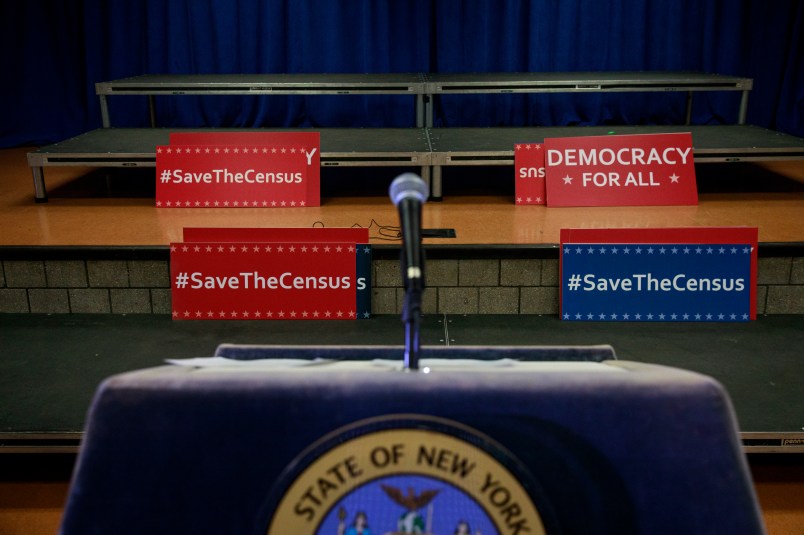The Justice Department, not surprisingly, told the Supreme Court Thursday it should not delay its decision in the census citizenship case so that a trial court could consider new evidence about the citizenship question’s origins.
The Trump administration also sought to head off any additional litigation, after the Supreme Court hands down its decision, on the issue currently percolating in Maryland over whether the move to add the question was racially discriminatory.
The challengers in the census case coming out of New York had previously requested that the justices to postpone their decision, expected in a matter of days, in light of newly obtained files from the hard drives of a now deceased GOP consultant.
The files suggested that the consultant, Thomas Hofeller, played a role in creating the rationale that the administration ultimately used to justify adding the question — a rationale three federal courts ruled was pretextual. Also found in Hofeller’s files was a secret 2015 study he wrote concluding that a census citizenship question would be necessary for a redistricting overhaul that would benefit Republicans and non-Hispanic whites.
The Justice Department’s response to the challengers’ request for the delay reiterated many of the Trump administration’s previous rebuttals to the new evidence: that it was irrelevant; that it doesn’t prove Hofeller was involved in Commerce Secretary Wilbur Ross’ decision to add the question; and that it doesn’t show that the administration was acting with a discriminatory intent.
The Department also took a shot at the trial judge, U.S. District Judge Jesse Furman in Manhattan, for his handling of the case now in front of the Supreme Court.
“If anything, private respondents’ motion only underscores the district court’s fundamental error in allowing respondents to stray beyond the administrative record in the first place,” the Justice Department said, referring to the set of records that supposedly reflect what Ross considered when deciding to add the question.
Whether it was appropriate that Furman order additional discovery beyond that record is one of the questions the administration has asked the Supreme Court to decide. However, Furman ruled that the question was a violation of administrative law on the basis of the administrative record.
Interestingly, the Department of Justice also on Thursday flagged for the justices what has also been going on in a separate case challenging the question that had been brought in Maryland. The trial judge there on Wednesday said he would like another chance to decide whether the Trump administration added the question with a discriminatory intent, in light of the Hofeller files.
In an apparent effort to head off any additional litigation of the discriminatory intent claim — which is currently being considered by the 4th U.S. Circuit Court of Appeals — the Justice Department asked the Supreme Court to resolve it in the decision it hands down in the next week or two.
“[T]o avoid addressing the issue in an emergency posture,” the Justice Department said, “the Court may wish to address the equal-protection claim in its opinion to make clear that neither respondents’ original evidence nor the Hofeller files demonstrate any racial animus on the part of Secretary Ross.”
“Indeed, a finding that the Secretary’s decision cannot be set aside as pretextual …
necessarily forecloses a claim that it may be set aside as pretextual for a discriminatory reason,” the Justice Department said.
Read the filing below:






